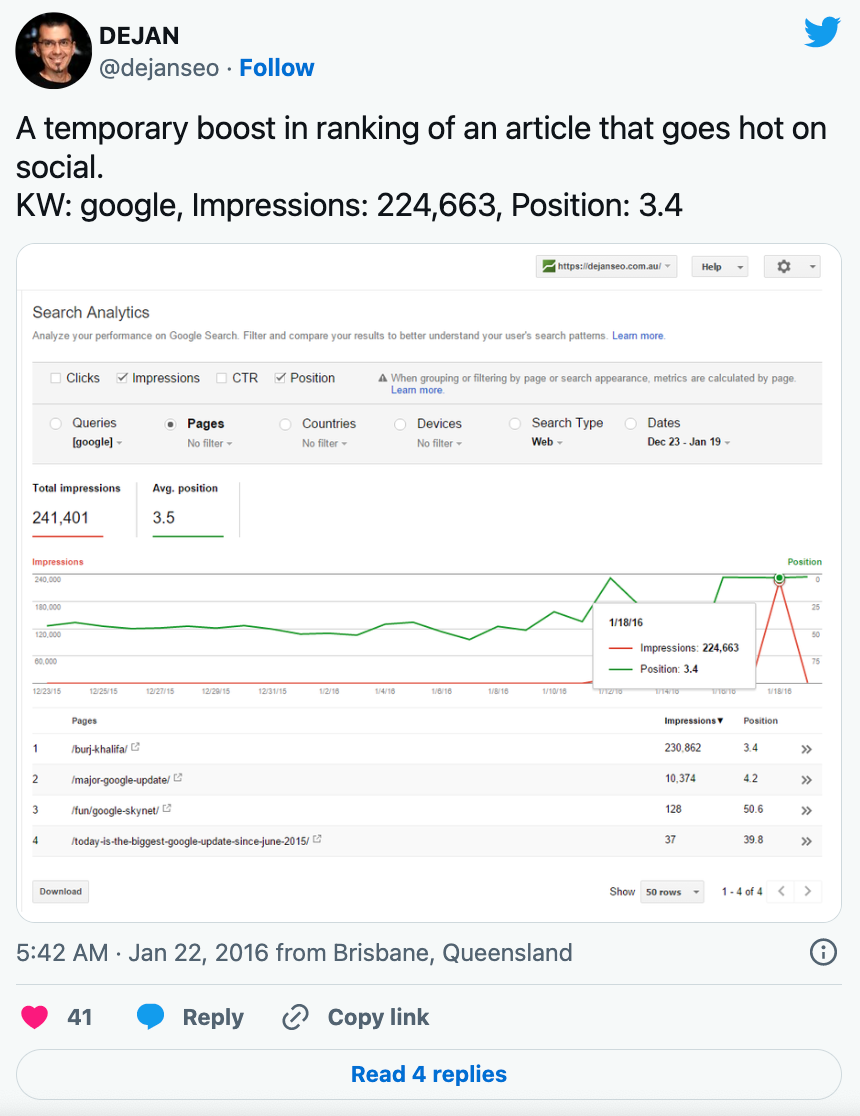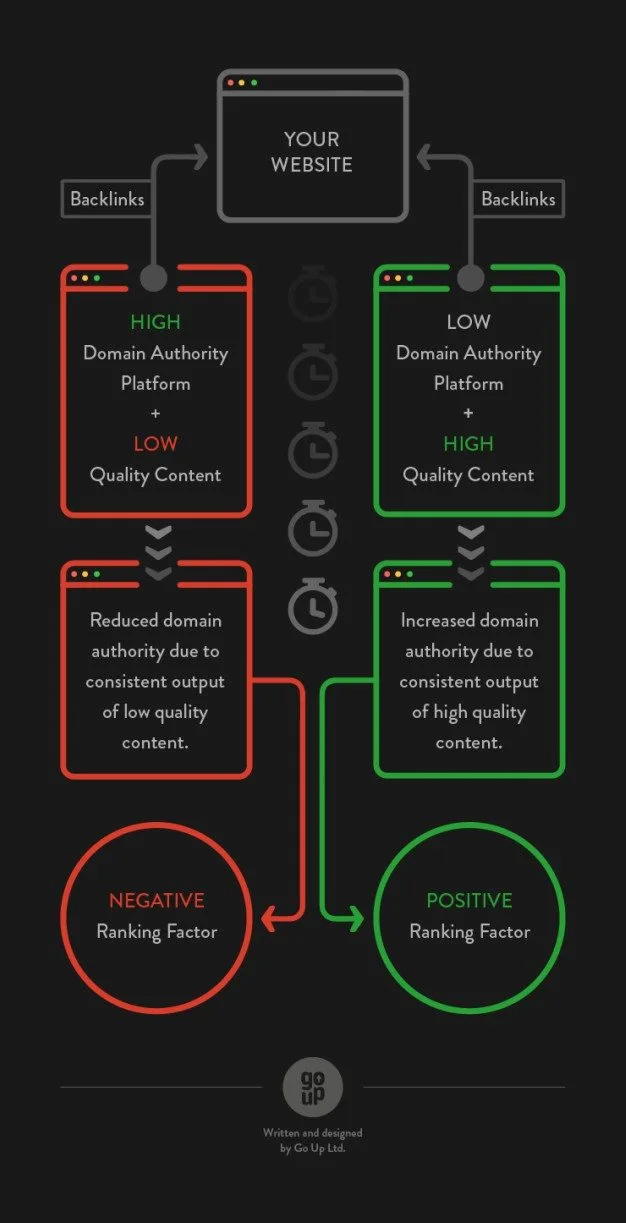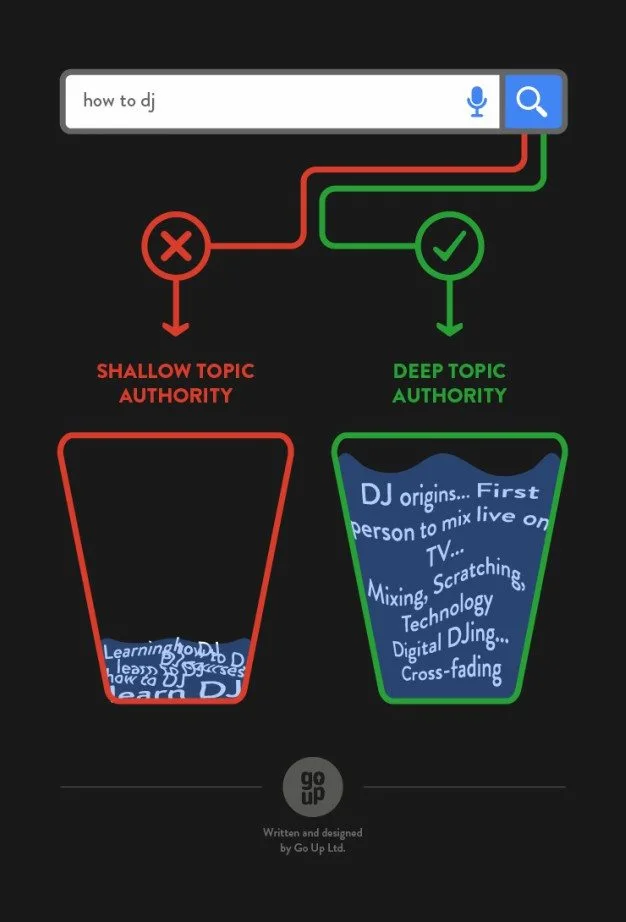
10 mins
OpenSEO vs PPC: The pros, cons, and how they can complement each other in a search campaign
6 mins
SEO trainers from Backlinko published a study based on a whopping 1 million search results. The study’s results showed us what we already know: links and content continue to be some of the biggest determinants of good rankings.
26th February 2016

The study proved that ranking factors were exclusively connected to backlinks and content.
The dominating ranking factors from Backlinko were exclusively connected to backlinks and content (commonly understood as the basic core components of any SEO campaign). Comparatively recent topics of interest within the SEO community, HTTPS and Schema, were also analysed. While there was strong correlation between HTTPS and favourable ranking, the presence of Schema was not deemed a ranking factor at all.
Most people with a cursory understanding of SEO will have known that link building and crafting content have always been considered vital for achieving boosted online visibility. While Backlinko’s study suggests this is as true as ever, links and content aren’t guaranteed to influence search results in your favour. You have to go about creating backlinks and writing content the right way – and there are plenty of ways to do it very wrong.
In this guide, we evaluate these powerful ranking factors, and advise on how best to approach them.
As Backlinko’s study has shown, backlink quantity is a strong ranking signal. But gaining good backlinks should be about more than just acquisition.
Here are three criteria for backlinks that should always be taken into account, and advice on how to get the most out of them.
It is important to nurture a domain that attracts links from your wider content audience i.e. not just your customer audience. Growing a diverse portfolio of referring domains is dependent on the kind of content you create as well as outreach. Regarding the latter, this can involve networking, earnest attempts to feature where you think you should be found, or coming up with imaginative ways to feature where you could be found.
Acquiring referring domains the wrong way:
An online jewellery store sources a popular auto enthusiast website to work with. They exchange emails and send a selection of their jewellery for review. The auto enthusiast website publishes a link to the jewellery store, advocating them as a reputable provider of quality jewellery.
Acquiring referring domains the right way:
Due to a sudden trend of car jewellery, an online jewellery store sources a popular auto enthusiast website to work with. They exchange emails and send a selection of their jewellery for review. The auto enthusiast website publishes an article about jewellery for cars and links to the jewellery store, advocating them as a reputable provider of quality jewellery.
Similarly to how a good reference works in academic text, a successful external link is a way to give credit for a unique and relevant source that enriches the page. The latter example accomplishes this. The former does not.
The authority of linking pages will affect how much it benefits you, so it may be worth thinking about how you can enhance the linking pages.
Acquiring a relevant backlink from a trustworthy website is an achievement to be proud of. However, the authority of the linking page will also affect how much it benefits you, so it may be worth thinking about how you can enhance the linking pages.
For example, social media engagement can affect page authority.

If you receive a link from a news article, sharing it through social media, forums or other means, can be an excellent way to ensure your backlink gets as much exposure as possible. Remember that links beget other links, so it’s more than possible that you could end up earning more backlinks while simply sharing your coverage.
Obtaining links from high domain authority (DA) sites will benefit a whole domain. Though this sounds easier said than done, links continue to pass value, so working with low DA but quality sites now could result in a much more potent link later. At the same time, avoid working with high DA but low quality websites. These should be easy to identify through one or a combination of factors such as: no user interaction, thin and poorly written content, strange layout etc.

Achieve favourable ranking by identifying the key theme of your chosen page and exploring the subject as comprehensively as possible.
The content on a website is enormously significant. Not only does it communicate concepts and topics that help search engines to better understand, and therefore position sites in search, but it’s also one of the best ways to attract links. This applies to landing pages, blogs and guides.
But similarly to links, creating the best content is not reactive nor is it impulsive. Quality content is considered, proactive and strategic.
Google’s Hummingbird update has contributed to the search engine’s ability to understand topics. That’s why you can ask questions like “How many episodes in Breaking Bad?” or “Who directed Lost in Translation?” and get instant answers without seeing much evidence of search results featuring words from your search.

This means repeatedly mentioning the same high-volume keyword on a webpage is not guaranteed to help it rank. Instead, it’s more likely to achieve favourable ranking by identifying the key theme of your chosen page and exploring the subject as comprehensively as possible. This leads to the possibility of ranking for both high-volume keywords, but also a range of long-tail keywords. Of course it will be important to ensure your content doesn’t overlap and run the risk of competing with other pages, but you could be surprised by how much more there is to discuss on some of your crucial pages.
While most people with industry insight will naturally write content that’s informed and diverse – and therefore build up an idea of topic authority – there are tools that can help your content go even further.
Keyword research tools like Google’s Keyword Planner and keywordtool.io can help you generate a table of vital vocabulary for any topic. Trawling the final pages of the Keyword Planner in particular can be incredibly useful. It’s likely that you’ll discover phrases with negligible search volume, but a combination of these keywords can make your content extra specialised.
The following scenario illustrates how we think Google is starting to assess websites based on topic authority:
Swap a web page on “learning to DJ” for a conversation with someone who claims to be an expert on learning to DJ.
Person 1: Mentions the exact phrase “learning to DJ” numerous times throughout the conversation along with other variations, such as “learn to DJ”.
Person 2: Talks about learning to DJ in the context of its history and pays reference to pioneering individuals who mastered popular techniques. Also discusses how technology has changed ways of learning.
Who would you believe was the better source of information?

The average word count of a first page search result is 1890.
According to the Backlinko study, the average word count of a first page search result is 1890.
In other words, content with a substantial word count seems to be correlated with improved rankings. This could be for a number of reasons: perhaps long-form content commands elevated topic authority due to its sheer length, maybe it’s so in-depth that it becomes an industry resource and gets cited by numerous platforms as a consequence.
However, there’s no need to cease your regular short-form blog output or immediately beef up your landing pages.
There will always be some subjects that can be satisfactorily covered in fewer words. For example, using the blog as an opportunity to answer very specific questions relevant to your industry probably won’t demand 1000+ words per question. And just because a page can reach 1000+ words, doesn’t mean it always should.
Taking topic authority into account, if you have a concise 500 word post and add another 500 words to make it longer, you could run the risk of diluting your authority. Furthermore, your concise content could be rewarded with Google’s knowledge box for certain searches.
However, the opposite is also true: if you tackle a subject that warrants extensive discussion but only provide a general overview, it’s unlikely that you’ll influence the search results.
Investigation will be necessary in order to find what topic is worth the investment of time for long-form content. Mining data from queries in Search Console and keeping abreast of issues relevant to your industry can help.
SEO does not sit still, so it’s essential for agencies and practitioners to research and talk about new developments in search.
An example of how we can expect ranking factors to shift in the future can be found in the video below, where John Mueller of Google mentions the likelihood of structured data becoming more important.
There’s no doubt that staying up to date with such information will enhance SEO strategies. But it’s equally important that new developments in SEO don’t distract the attention of you or your SEO Agency from the basics – to believe the way Google views them has remained static is a dangerous assumption. If Backlinko’s study has proved anything, it’s that respecting Google’s increased ability to tell quality links from poor ones and good content from fluff will be increasingly important for achieving visibility in search.